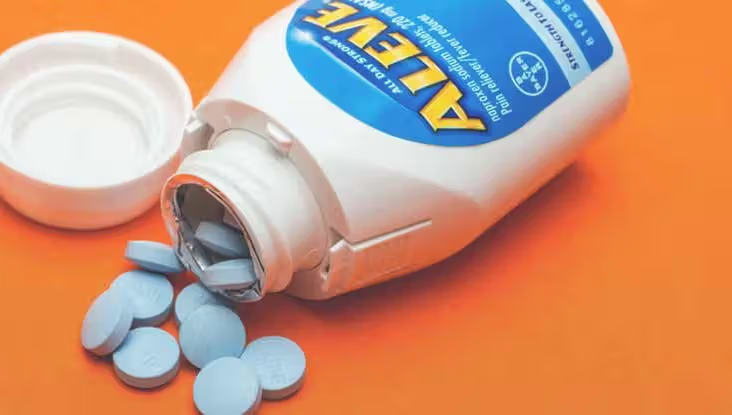Aleve is a popular over-the-counter medication widely used for pain relief and inflammation reduction. This article provides an in-depth look at Aleve, its active ingredient, uses, benefits, potential side effects, precautions, and other relevant information to help you make informed decisions about its use.
Aleve is a brand name for naproxen sodium, a nonsteroidal anti-inflammatory drug (NSAID). It is used to treat a variety of conditions including pain, inflammation, and fever. Available without a prescription, Aleve is a trusted choice for many individuals seeking effective and long-lasting relief from discomfort.
The Active Ingredient: Naproxen Sodium
The active ingredient in Aleve is naproxen sodium, a derivative of propionic acid. Naproxen sodium belongs to the class of NSAIDs, which work by inhibiting enzymes involved in the inflammatory process. Naproxen sodium is known for its ability to provide prolonged pain relief compared to other NSAIDs, making it a convenient option for individuals requiring sustained pain management.
Mechanism of Action
Naproxen sodium works by blocking the production of prostaglandins, substances in the body that play a key role in inflammation and pain. It inhibits the activity of cyclooxygenase (COX) enzymes, specifically COX-1 and COX-2, which are necessary for the synthesis of prostaglandins. By reducing the production of these compounds, naproxen sodium helps alleviate pain and reduce inflammation.
Uses of Aleve
Pain Relief
Aleve is effective in treating mild to moderate pain from various sources, such as:
- Headaches and migraines
- Dental pain
- Menstrual cramps
- Muscle aches
- Back pain
- Arthritis pain
- Post-surgical pain
Inflammation Reduction
Aleve is commonly used to reduce inflammation associated with conditions like:
- Osteoarthritis
- Rheumatoid arthritis
- Ankylosing spondylitis
- Tendinitis
- Bursitis
Fever Reduction
Aleve can also be used to lower fever and alleviate symptoms of common colds and flu.
Dosage and Administration
The typical adult dosage for Aleve is one tablet (220 mg) taken every 8 to 12 hours. For the initial dose, two tablets (440 mg) may be taken within the first hour. However, it is important not to exceed three tablets (660 mg) in 24 hours unless directed by a healthcare provider. Aleve should be taken with a full glass of water, and it is advisable to take it with food or milk to minimize gastrointestinal discomfort.
Benefits of Aleve
Aleve offers several benefits that make it a preferred choice for many individuals:
- Long-lasting relief: Aleve provides pain relief for up to 12 hours, reducing the need for frequent dosing.
- Convenience: Its over-the-counter availability makes it accessible without the need for a prescription.
- Versatility: Aleve is effective for a wide range of conditions, from headaches to arthritis.
- Anti-inflammatory properties: In addition to pain relief, Aleve helps reduce inflammation, which is beneficial for chronic inflammatory conditions.
Potential Side Effects
Like all medications, Aleve can cause side effects. While many people experience no or minor side effects, some individuals may experience:
- Gastrointestinal issues: Nausea, vomiting, heartburn, stomach pain, or ulcers.
- Cardiovascular risks: Increased risk of heart attack or stroke, especially with long-term use or in individuals with existing heart conditions.
- Kidney problems: Reduced kidney function or kidney damage, particularly in those with pre-existing kidney issues.
- Allergic reactions: Rash, itching, swelling, dizziness, or difficulty breathing.
Precautions and Warnings
To ensure safe use of Aleve, consider the following precautions:
- Medical history: Inform your healthcare provider of any medical conditions, particularly heart disease, high blood pressure, liver disease, kidney disease, or gastrointestinal disorders.
- Allergies: Disclose any known allergies to NSAIDs or other medications.
- Surgery: Consult your doctor before using Alev’e if you have upcoming surgery, as it may increase bleeding risk.
- Alcohol consumption: Limit alcohol intake while taking Alev’e to reduce the risk of gastrointestinal bleeding.
Interactions with Other Medications
Alev’e can interact with various medications, potentially affecting their efficacy or increasing the risk of adverse effects. Notable interactions include:
- Anticoagulants: Increased risk of bleeding.
- Other NSAIDs: Increased risk of side effects without additional benefit.
- Corticosteroids: Higher risk of gastrointestinal issues.
- Diuretics and antihypertensives: Reduced effectiveness of these medications.
- Methotrexate: Increased toxicity risk.
Conclusion
Alev’e is a widely used and effective over-the-counter medication for pain relief, inflammation reduction, and fever management. With its active ingredient, naproxen sodium, Alev’e provides long-lasting relief for a variety of conditions. However, like all medications, it comes with potential side effects and interactions that must be considered. Always follow dosing instructions and consult with a healthcare provider to ensure safe and appropriate use of Alev’e for your specific health needs.
FAQs
What is the difference between Aleve and prescription-strength naproxen?
Prescription-strength naproxen contains higher doses of the active ingredient and is used for more severe or chronic conditions under medical supervision.
Can I take Aleve with other pain relievers?
It is usually advised not to take Alev’e along with other NSAIDs or aspirin because it may raise the likelihood of side effects. However, Alev’e can sometimes be combined with acetaminophen for extra pain relief. Always check with your healthcare provider before doing so.
How should I store Aleve?
Store Alev’e at room temperature, away from moisture and heat. Keep it out of reach of children.
Is it safe to drink alcohol while taking Aleve?
Alcohol can increase the risk of gastrointestinal bleeding when taken with Alev’e. It is advisable to limit or avoid alcohol consumption while using this medication.







